The views expressed in our content reflect individual perspectives and do not represent the authoritative views of the Baha'i Faith.
One of my earliest memories is of a simple children’s game, played with my young white-girl peers in Milwaukee, circa 1969. Looking into a fish tank, we tried to imitate the faces of the golden carp inside.
My playmates opened their eyes wide, pursed their lips into a delicate circle and performed an almost imperceptible opening and closing of the mouth — as if each were a kissing angel. Cute, but definitely not an accurate fish portrayal, I thought.
RELATED: Tierney Sutton’s New Song ‘Good People’ Confronts Racism
For my part, I looked closely at the mouths of the tiny creatures and tried to bend my own mouth to match: stretched as wide as possible, down at the corners, up in the center, I proceeded to slowly lower my mouth, moving only my lower jaw. One girl said, “Ewwwwww!! Gross!! That’s not what they look like!!”
But it was what they looked like.
At that moment, I learned seeing “ugly things” was seemingly not an ability of my peers and, in fact, was consciously avoided and highly frowned upon. I wondered why.
I was raised in a societal bubble. I attended public schools, first in an integrated urban Milwaukee community, but by middle school, I lived deep in the Milwaukee suburbs with the children of the wealthiest families in the state — and a smattering of Black kids who braved busing from the Milwaukee “core.” I remember maybe three Black students in my graduating class of 600.
My father, a civil-rights and criminal defense lawyer who anguished greatly over our flight to the suburbs and knew the truth of our privilege, responded to the move by sarcastically referring to my new school as “Garden Grove Creamery” and my classmates as “Creamers.” I’m ashamed to say the obvious reference to whiteness went over my head until recent years. Wisconsin being the dairy state, I somehow missed it. What a dope I was. Whiteness was definitely Dad’s meaning.
As a young person, I became a Baha’i not only because of the Faith’s emphasis on the oneness of humanity and the elimination of all prejudice, but because Baha’u’llah wrote, “Beautify your tongues, O people, with truthfulness, and adorn your souls with the ornament of honesty.”
To be honest, the things I’ve learned in the last 15 years about the systemic racism baked in to government policies of housing, city planning, education, criminal justice, healthcare, loans, taxation, the food we eat, and the air we breathe — these realities are what I’ve come to call “sinus-clearing facts.”
As I learn these facts, I can’t count the number of times in the last years that I’ve said out loud, “Holy Sh!%! REALLY???”
After a few months, the shock of my discoveries wore off and transformed into sighs of recognition. I began to expect that if I looked closely into ANY aspect of American life, into any government institution, city, state, or federal, the corruption of racism would become obvious. Things I had once dismissed as the crazy conspiracy theories of radical Black folks have turned out to be absolutely true and easily researched and proven. Much of White America seems to love far-fetched conspiracy theories, but the stuff in plain sight? Not so much.
Let’s just start here: the average White household in the United States has 10 times the amount of wealth as the average Black one. This statistic has remained static for decades. We don’t need to look into some obscure conspiracy to understand why.
We live in a capitalist society, which makes the American dream a simple formulation: In this country, if you work hard, you may face some prejudice, and you may have to start at the bottom, but you, too, can succeed. The opportunities are here. Most people accept this myth — and yet, we all played “Monopoly” as children … so somewhere, deep down, we’ve always known better.
The activist Kimberly Jones perfectly described the economic-history-of-the-U.S.-as-Monopoly metaphor after the murder of George Floyd and the ensuing looting and unrest:
For 400 rounds of Monopoly, you don’t get to play at all. Not only do you not get to play, you have to play on the behalf of the person that you’re playing against. You have to play and make money and earn wealth for them and then you have to turn it over to them. So then for 50 years, you finally get a little bit and you’re allowed to play and every time that they don’t like the way that you’re playing or that you’re catching up, or that you’re doing something to be self-sufficient, they burn your game. They burn your cards. They burn your Monopoly money.
And finally at the release and the onset of that they allow you to play and say:
“O.K., now you catch up.”(Civil Rights Act of 1964) At this point, the only way you’re gonna catch up is if the person shares the wealth. Correct? Well what if every time they share the wealth there’s psychological warfare against you to say ‘you’re an equal-opportunity hire’….”
As a white child in the US, of course, I learned of the existence of slavery. But the emphasis was always on its abolition or on Abe Lincoln, the martyred “Great Emancipator.” Was I taught the economic reality? Was I taught the details of the brutality? The torture? The separation of families? The prevalence of rape and sexual violence? The fact that the founding fathers were, by and large, enslavers?
No.
The real ugliness of it all, like the face of my fish, was glossed over, made palatable. Instead, I learned that we are the “land of the free, home of the brave.” We are good people. We are nice and Christian and anything we did that was wrong … well … Christ died for our sins. We’re good. We’re saved. Let’s forgive. Let bygones be bygones.
I’ve come to realize that I was given a strange and rare gift as a White child growing up in the Midwest: My family was a mess and my parents didn’t lie about it, to me, to others, or to themselves. My father was an alcoholic, a compulsive gambler, a womanizer, and likely bipolar. My mother was a sharp-tongued, brilliant, and beautiful woman paralyzed and brain-damaged at 41 from a devastating stroke shortly after the birth of twin boys when I was 12. Our house was usually a pig-sty. My father moved out after admitting to my mother that he had a girlfriend — but continued to see to my mother’s care until the end of her life.
Once, as I was cleaning up my mother, in the bathroom after one of her many accidents, she said, “I’m so sorry you have to do this.” I answered, “It’s OK, Mom,” and she responded, “No it isn’t — it’s really hard!” My father once said to me, “Everyone has a purpose, even if it’s to be a bad example.” I lived in a world where we recognized ugliness all the time, didn’t lie about it, and faced it squarely. I didn’t realize how rare that was in White, middle-class America.
Of course, I found myself envying my friends who had “nice,” soft-spoken parents and immaculate houses. And yet, at the same time, their parents often gave me the creeps. The “nicer” they were, the more I felt something was off — and much of the time, I eventually found out that there was, indeed, something profoundly wrong in those families. Substance abuse, sexual abuse, addictions of all kinds, financial corruption, you name it. Referring to one such mother, my own said, “I’m not really comfortable with Sue — she’s smug.”
“Smug.” The word perfectly encapsulates what I saw and continue to see in my White American peers. It’s not just pride, either — it’s a kind of deep disease of dishonesty, fed by the skill we seem to have to simply look away from the unpleasant, the ugly, the unjust, the brutal, the sad. It arises from our inability to be real with ourselves and with others.
I’ve come to believe that this endemic, conscious lack of perception has badly damaged us all — not just the Black and Native American people who have been brutalized for centuries.
Last night, I watched the gut-wrenching documentary “Great Photo, Lovely Life.” It tells the story of a family whose patriarch was an active pedophile who molested his daughters, granddaughter, and countless others for more than 50 years. As a result of being “caught” molesting the daughter of his business partner, he was forced out of his business and lost his license to work as a chiropractor. Unbelievably, he was not turned over to the police at that time, but was simply forced to move. After being prosecuted for molesting a neighbor’s child in the next town, he was, at last, imprisoned but released after just two years for “good behavior.”
RELATED: Performative vs. Active Allyship: Your Motivation Matters
The documentary — produced by the man’s granddaughter, who, after suffering from sexual assault herself (not from her grandfather) — decided to confront her grandfather on behalf of her mother, her sister and several of the other women who were abused by him as young children. The treacly “niceness” oozing from every word out of this man’s mouth nauseated me — even before his terrifying admissions, cloaked in the same “niceness,” about his “problem” and “struggle.”
The women have to grapple with the fact that the man’s wife (their mother and grandmother) never faced or spoke of the abuse she undoubtedly knew about, and as such, allowed her own daughter and granddaughter, as well as many other children, to be victimized by the man.
My Faith tells me that “truthfulness is the foundation of all human virtues.” Abdu’l-Baha said:
A truthful person will be protected from all moral afflictions, will shrink from every evil deed, and be preserved from every wicked act, inasmuch as all vices and misdeeds are the very antithesis of truthfulness, and a truthful man will hold them all in utter abhorrence.
What has been the spiritual and moral effect on the White American psyche from centuries of dishonesty and willful blindness toward racism? What happens when we, as a society, become experts at looking away from the horrors and injustices that exist in plain sight? What is the price to be paid? What I saw in “Great Photo, Lovely Life” felt like a part of that price — a generalized inability to honestly see or face any unpleasant truth or tolerate any conflict, even when we ourselves and our children are the victims. That’s an extremely high price to pay.
You May Also Like
Comments



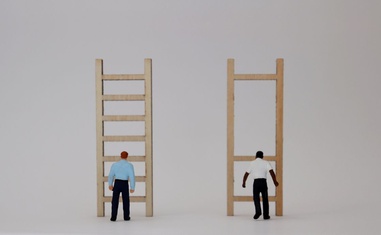

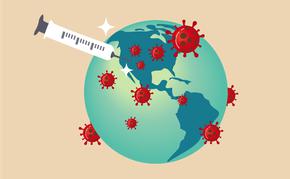

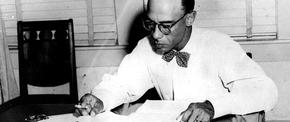
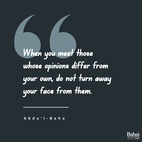
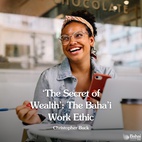
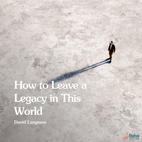
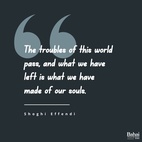
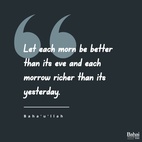
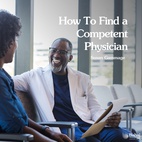
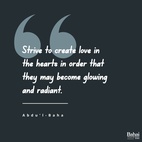
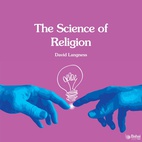

Thank you, Tierney, ...for sharing your perspective. I'm still unsure what we can do about all this other than share the Faith with receptive souls and hope its teachings can transform them. -- Wendy